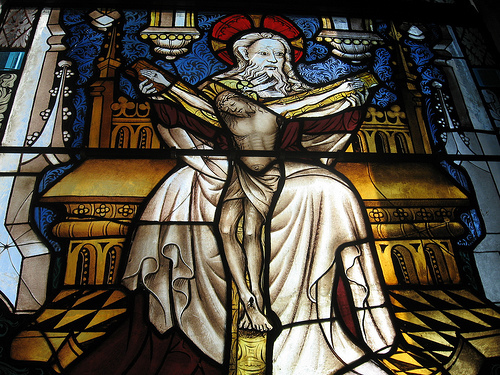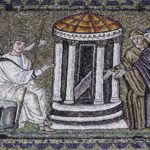We run our website the way we wished the whole internet worked: we provide high quality original content with no ads. We are funded solely by your direct support. Please consider supporting this project.

Was Jesus Abandoned by the Father on the Cross?
As Jesus hung on the cross, he cried, “Eli, Eli, lema sabachthani?” (Mt 27:46). This is the cry of our God who stooped to the furthest possible depths to experience his own antithesis, as the all-holy God becomes the sin of the world (2 Cor 5:21) and the perfectly united God becomes the curse of our separation from God (Gal 3:13).
Not surprisingly, this cry has always troubled theologians who were invested in preserving the classical understanding of God’s impassibility and immutability. How could God the Son truly experience abandonment from the Father if the Trinity is “above” suffering and “above” experiencing any kind of change? Hence, to insolate the divinity of Jesus from any suffering and change, the general way classical theologians have interpreted Jesus’ desperate cry was to argue that it arose out of his experience as a full human being, not his divinity. Among other problems, this interpretation calls into question the unity of the person of Jesus Christ and thus borders on Nestorianism. Not only this, but if God himself did not experience change and suffering on the cross, one is hard pressed to see how Jesus’ experience of change and suffering actually reveals God—let alone constitutes the quintessential revelation of God!
In more recent times a number of scholars have argued that Jesus was quoting the first line of Psalm 22. Since Psalm 22 ends on a note of hope in God’s redemption (vss. 22-31), some have suggested that Jesus’ apparent cry of despair might actually have been an expression of confidence that his abandonment was going to be temporary and that his Father would ultimately vindicate him.
But even if Jesus was alluding to the entire Psalm and was confident he would eventually be restored, this does not negate the truth that he was genuinely experiencing God-forsakenness and was, in his supremely tormented state, even experiencing confusion as to why it was happening.
It is not merely that Jesus experienced genuine God-forsakenness, he was in fact genuinely forsaken, as a number of theologians and NT scholars have emphasized in recent years. James Edwards, for example, says that on the cross, “Jesus is wholly forsaken and exposed to the horror of humanity’s sin.” This horror, he adds, is “so total that in his dying breath he senses his separation from God.”
At the same time, the unity of the Trinity could not be temporarily severed. If God’s eternal essence is the perfect loving unity of the Father, Son and Holy Spirit, then any suggestion that this perfect unity could be “severed,” even for a moment, would, by definition, entail that the Trinity could conceivably cease to exist. At the very least, if the “innermost life of the Trinity” could conceivably be threatened, the union of the three Persons must be understood to be a contingent, rather than a necessary, reality. And in this case, we cannot claim that God’s very essence is the loving union of the three Persons.
We can simultaneously affirm the ongoing, unbroken unity of the Trinity while also affirming the authenticity of Christ’s cry, on the other, if we simply remember that that this separation was entered into by all three divine Person’s out of love for human kind and for one another. As paradoxical as it sounds, the anguished separation of the Father and the Son on the cross constitutes the quintessential expression of the loving unity of the Father and the Son. Indeed, the unsurpassable cost of this divine separation expresses the unsurpassable perfection of the love of this divine union.
Perhaps the best way of thinking about this is to distinguish between the love and unity that the three divine persons experience, on the one hand, and the love and unity that defines God’s eternal essence, on the other. We could say that on the cross, the former was momentarily sacrificed as an expression of the latter. That is, the three divine Person’s sacrificed their previously uninterrupted experience of perfect love and union in order to express the perfect love and union that defines them as God.
Image by jlwelsh via Flickr.
Category: Q&A
Tags: Abandonment, Cross, Jesus, Love, Trinity
Topics: Atonement and The Cross
Related Reading

Getting Behind the “Letter” of Violent Portraits of God
“I will do to you what I have never done before… in your midst parents will eat their children, and children will eat their parents…” Ezek. 5:9-10 In my previous post I offered a brief review of Matthew Bates’ fascinating work, The Hermeneutics of the Apostolic Proclamation by Matthew Bates (Baylor University Press, 2012). Among other…

What the Resurrection Says About the Cross
As with every other aspect of Jesus’ life and ministry, even the resurrection must be understood in light of the cross. This event was not just the resuscitation of a random corpse. It was the resurrection of the Incarnate Son of God who had fulfilled the human side of the God-human covenant by living a sinless…

Radical is in the Eye of the Beholder
Josias Hansen is a Brazilian-born, Charismatic Mennonite student at Luther Seminary in St. Paul, MN. Together with Third Way Church, Josias enjoys experimenting with what it looks like to take Jesus seriously as a jolly community of kingdom disciples. Was Jesus a radical? Did he do and teach radical things? What if I were to tell…

Which of the Miracles of Jesus Can Humans Do? (podcast)
Greg is asked about the miracles of Jesus, specifically which miracles do we have the potential to perform. He also gives a nod to the band Theocracy. Episode 74 http://traffic.libsyn.com/askgregboyd/Episode_0074.mp3

Parable of the Jerk Loser Son
Birmingham Museum and Art Gallery via Compfight Peter Enns blogged about the parable of the prodigal son, or as he likes to call it, “the parable of the jerk loser son.” It’s actually a reflection about the unbelievable and scandalous love of God. I guarantee it will bless you. From the article: The story isn’t about…

Sermon Clip: Keeping Christmas
Through Christ, God fulfills all his promises, and by yielding to him and giving up control, we can set ourselves free. Full Sermon here: http://whchurch.org/sermons-media/sermon/keeping-christmas
